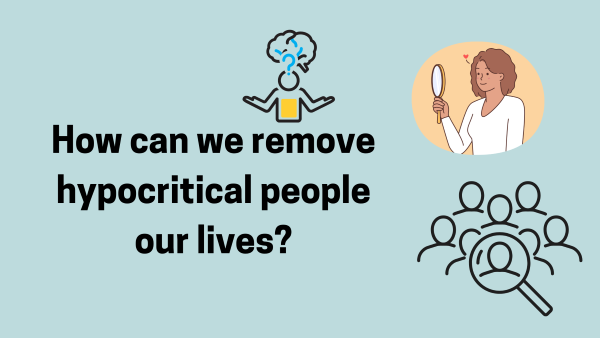
How can we remove hypocritical people from our lives?
- Recognising Hypocrisy
- Symptoms of Insincerity
- Techniques for Eliminating Hypocritical Individuals from Your Life
Introduction
Meeting hypocritical people is a frequent occurrence that may have a big influence on both personal and professional success. This article explores in-depth methods for recognizing, dealing with, and successfully removing hypocritical individuals from your life to promote better, more real relationships.
Recognising Hypocrisy
When someone claims to uphold ideals or convictions but doesn’t regularly act on them, that person is hypocritical. It’s critical to identify hypocritical behaviours to distinguish sincere connections and preserve mental health.
Symptoms of Insincerity
1. Inconsistency
They claim to adhere to certain ideals yet act otherwise.
For example, try promoting honesty while often committing falsehoods.
2. Double Standards
Holding oneself to a distinct set of standards or guidelines from others.
For instance, pointing fingers at others for small faults while absolving themselves of larger ones.
3. Selective Honesty
Concealing information or warping the truth in order to further one’s objectives.
As an illustration, share partial facts to sway opinions.
4. Absence of Accountability
Ignoring accountability for their deeds or errors.
As an illustration, blaming other people or other forces for their mistakes.
Techniques for Eliminating Hypocritical Individuals from Your Life
1. Assess the Effect on the Relationship
Examine the impact the hypocritical conduct has on your happiness, relationships, and general well-being. Based on how the connection affects your life, decide if it is worthwhile to continue.
2. Define Firm and Explicit Boundaries
Set clear limits on what constitutes appropriate conduct and Communication. Make sure the person understands these limits and is ready to impose penalties for crossing them.
• An example might be, “I appreciate being honest with you. Our partnership will need to be reevaluated if you keep fabricating information.”
3. Deal with the Action Straightforwardly
When you approach the person, act assertively and quietly. Provide particular instances of their activities and the results of those actions. Avoid criticizing their character and instead concentrate on observable behaviors.
• For instance, “I’ve observed a pattern where you berate people for being late to meetings, but you frequently arrive late yourself.” This variability impacts both team morale and production.”
4. Reduce Communication
Limit your contact and involvement with the hypocrite as much as you can. Restrict their participation in initiatives or circumstances where their actions might impede development or add needless stress.
• As an illustration, turn down invites to gatherings where the person’s conduct could be upsetting or tense.
5. Foster Genuine Connections
Make connections with people who exhibit honesty, reliability, and regard for one another a priority. Be in the company of individuals who uphold your ideals and foster your personal development.
• As an illustration, spend more time with friends or coworkers who value integrity and responsibility.
6. Take Care of Yourself
Participate in activities that enhance well-being well-being and emotional resilience. Make self-care activities a priority, such as exercising, practicing mindfulness, and spending time with uplifting friends and family.
• As an illustration, try using relaxation techniques to lessen the tension brought on by dealing with people who lack integrity.
7. Seek Advice and Assistance
If things are too complicated or stressful, seek advice from mentors, seasoned friends, or licensed counselors. If the inconsistency affects work dynamics in a professional context, consider speaking with HR or management.
• As an illustration, talk with a mentor about tactics for handling relationships with coworkers who exhibit hypocrisy.
Conclusion
Eliminating hypocritical people from your life is crucial to preserving your emotional stability, genuineness, and trust. Establishing limits, dealing with conduct authoritatively, and placing a high value on sincere relationships all help to foster a more positive atmosphere that supports both professional and personal development.
Today, be proactive in recognizing and handling relationship hypocrisy. Promoting responsibility and integrity makes life happier and more satisfying.
